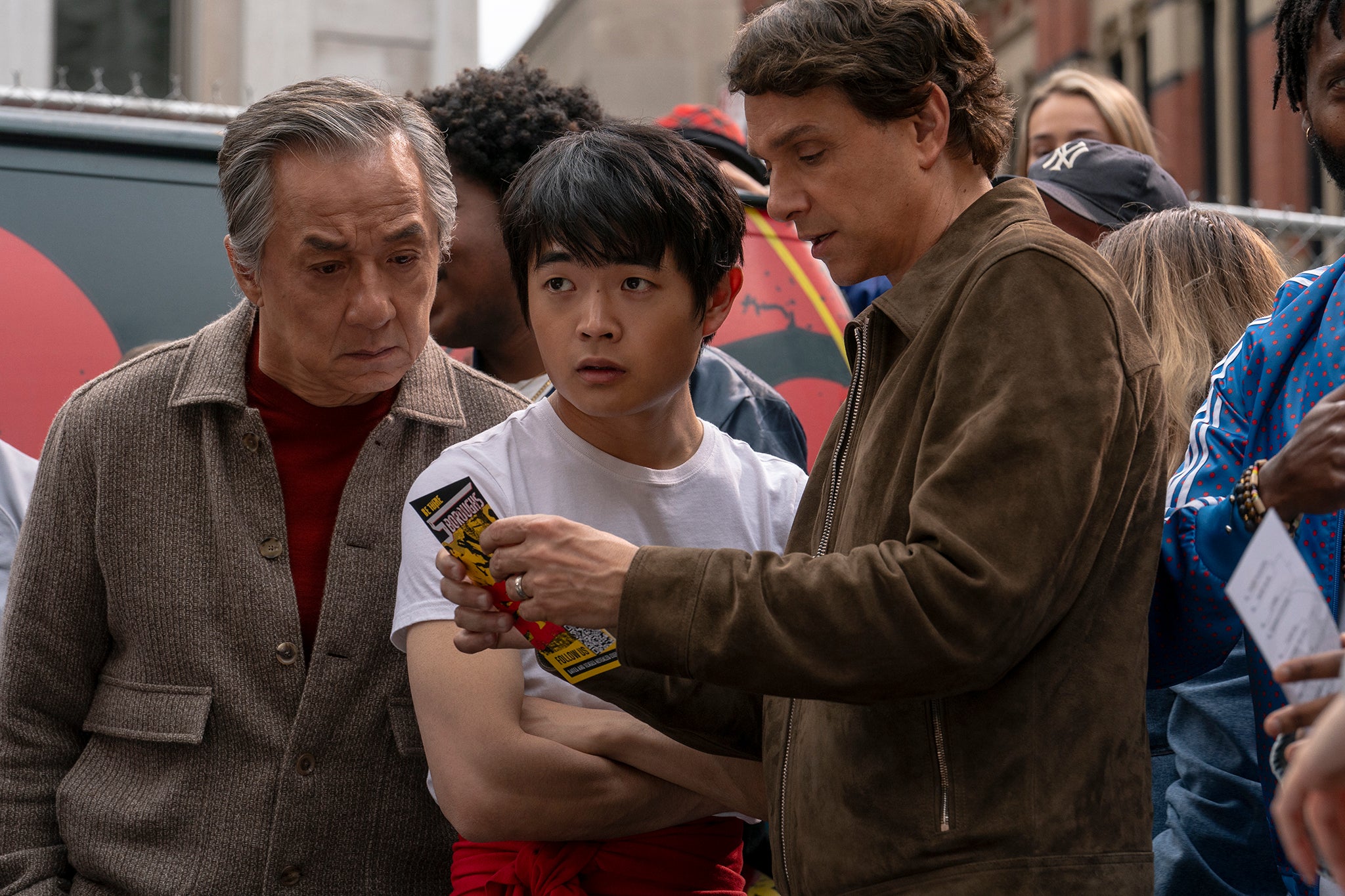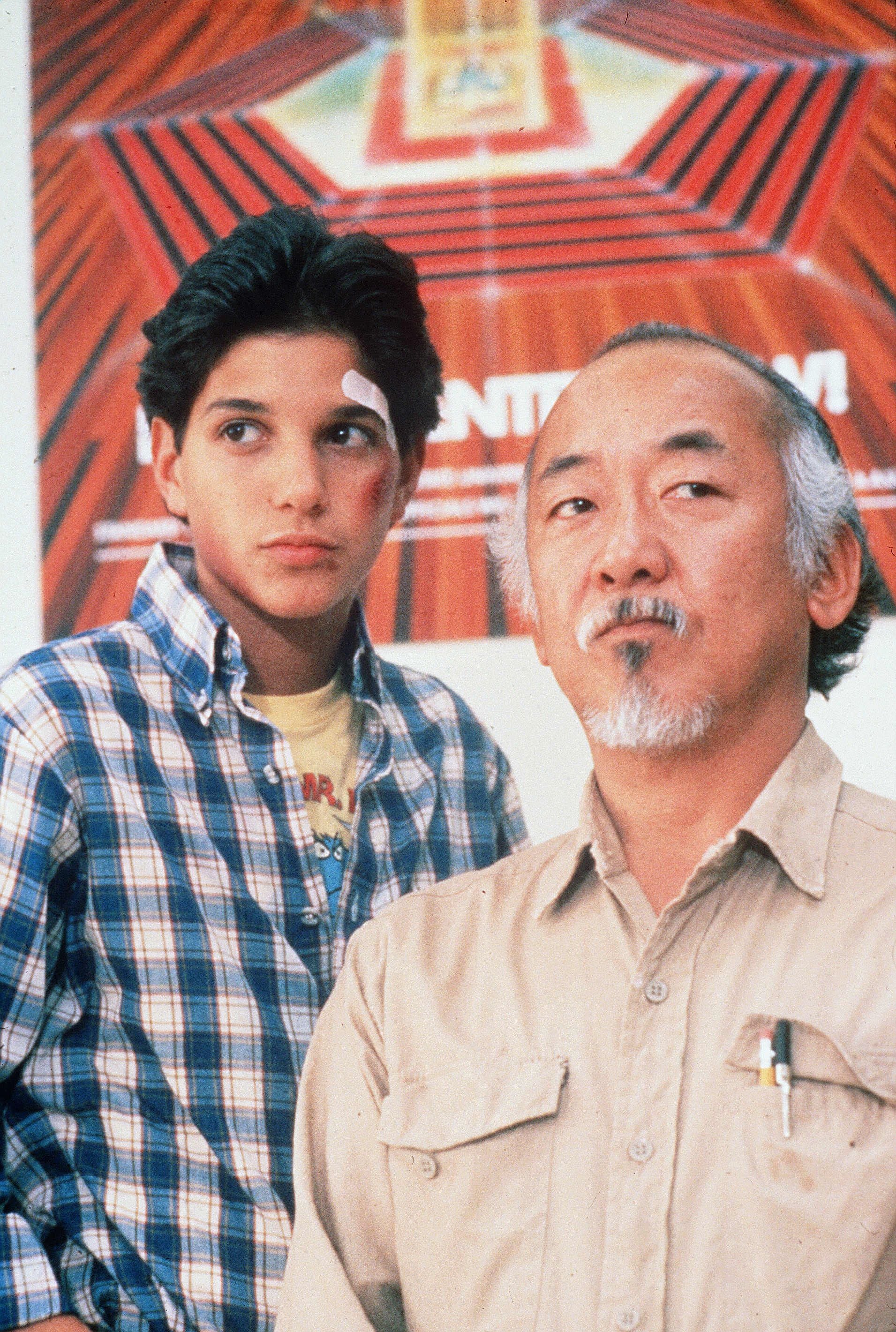Jackie Chan on the return of the Karate Kid: ‘If I have to jump off a building, I need a stunt double now’
As a revival of the cult franchise hits cinemas, Louis Chilton speaks to the Hong Kong superstar, the original ‘Karate Kid’ Ralph Macchio and new ‘Kid’ Ben Wang about the legacy of the first film, dangerous stunts, and ageing as an action star
We called it ‘Jackie Week’ – when Jackie Chan showed up to set,” says Ben Wang, the endearing 25-year-old star of the new franchise reboot Karate Kid: Legends. “We were working up in Montreal, Canada, and we had this amazing French-Canadian crew. But the moment Jackie shows up, they’re like, running around, going, ‘Jac-kie is here! Jac-kie is here!’, bumping into things like Keystone Cops. All that cool French-Canadian swagger melted away the second Jackie steps on set.”
But, really, can you blame them? Even at the age of 71, the Hong Kong action icon is a hurricane unto himself. Of course people are going to panic. Indeed, there could hardly be a more fitting title for the new Karate Kid, which unites Ralph Macchio – a legend in the world of Karate Kid, having played the plucky up-and-comer Daniel LaRusso in the original 1980s action trilogy – with Chan, a legend of cinema itself.
Chan’s character, Mr Han, first mentored Jaden Smith in 2010’s China-set Karate Kid reboot, and returns in Legends to riff with LaRusso as a two-man martial arts training team. Wang and Macchio now sit before me in a central London hotel – Chan, wearing a beige tracksuit, sits between them.
“People call me ‘superstar’,” says Chan. “They call me a legend. And it’s like, ‘Thank you so much.’ That means all those years, what I do – all those years I risk my life to do this kind of [work] – they mean something.”
It was Chan’s utter physical ingenuity that made him a star, both in Hong Kong in the 1980s, and – with unprecedented cross-cultural success – in the US and Europe, in the late 1990s and 2000s, via English-language hits such as Rush Hour and Shanghai Noon. There’s no overstating what it means to get Chan aboard a project like Legends – his first live-action American blockbuster in 15 years. “Jackie Chan? He was Jackie Chan. Our director likes to describe him as martial-arts-film Santa Claus,” laughs Wang. “This sort of mythological thing that children get giddy about. He turns the whole set into a Christmas wonderland of kicking a bunch of people.”
Legends follows a familiar formula. There’s a kid (Li Fong, played by Wang), who moves to a new city with his widowed mother (Ming-Na Wen). Once there, he finds romance (with a self-possessed pizzeria employee played by Sadie Stanley). He finds a nemesis (a sneering, ponytailed Aramis Knight). And he finds mentorship (from Chan, and later Macchio, both filling the role of Pat Morita’s Mr Miyagi). All roads lead to a high-stakes karate tournament – it’s a tale as old as time. Or a tale as old as 1984, at least.
Jackie was always changing things, or having suggestions. To the credit of our filmmakers and our crew, we were like, ‘If Jackie Chan has an idea, we’re gonna listen’
“The original Karate Kid felt really all-American to me,” says Wang. “It was directed by the same guy who did Rocky – how much more American can you get? But at the same time, it had this Asian American lead, in Pat Morita, that brought such a unique flavour to it.” Plus, he adds, these films have “always shown so much respect for Asian martial arts. I meet so many people who started doing karate because of The Karate Kid. I started doing taekwondo because of the Jackie Chan Karate Kid. The franchise is this really wonderful bridge of understanding between cultures.”
Macchio, sitting cheerfully and reverently on the flank, agrees. “Any time you can inform your audience about a different culture, it’ll be positive,” he says. “Martial arts is a way of life. It’s not just fighting – it’s self-esteem, it’s discipline, it’s respect, all these things.”
For Chan, too, the film has a level of personal resonance. “I’ve been very lucky to work with him,” Chan says, gesturing towards Macchio. “When the [original] Karate Kid came out, I was young, I was depressed, and wanted to give up training. I was a stuntman – no job, the economy no good,” he says. “Then I see Karate Kid, and, wow – it brings my confidence back, and I [start] training again. And somehow, now, we work together. It is a dream come true.”

It’s possible that Chan is conflating two time periods in the telling of this – by the point the original Karate Kid came out, he was already well underway establishing himself as a major action star, through films such as Drunken Master (1978), The Young Master (1980) and Project A (1983), the latter two of which he also directed. But it seems The Karate Kid holds genuine significance for the man who has himself formed a fascinating cultural bridge between Asia and Hollywood.
It’s a meaningful role for Wang as well – not to mention quite possibly a star-making one. A lithe performer with training in musical theatre (and, less formally, in martial arts), he was plucked from a pool of 10,000 hopefuls to play Li Fong. “Ralph gave me a really kind phone call before he came to set,” Wang recalls. “He said, ‘This film is about the journey of your character. I bring the legacy of the franchise – of the original films and Mr Miyagi. You bring what you need to make this character real.’ And that was really freeing.”
The Li Fong role is impressively athletic, involving flying kicks, upside-down sit-ups, the whole gamut – plus, says Wang, a fair amount of pain. “The worst injury I had was I sliced the tip of my pinky off,” he says, holding aloft his now-healed finger. “I mean, it sounds bad. It sounds bad. But Jackie came in the other day, and he was like, ‘Oh, yeah, I just came from the jungle.’ And then he pulled up his trouser leg, and his calf... like, it was bruised and [engorged]. He goes, ‘Yeah, I jumped off a tree and I hit the thing and then couldn’t feel my leg.” To reiterate: Chan is 71 years old.
Throughout his career, Chan has been renowned for both his daring stuntwork and his behind-the-camera meticulousness, and it seems that even now, this is still the case. “He was always changing things, or having suggestions,” says Wang. “To the credit of our filmmakers and our crew, we were like, ‘If Jackie Chan has an idea, we’re gonna listen.’

“It’s down to subtle, minute things that you wouldn’t normally associate with Jackie Chan. At some point, he started directing extras! Telling them, ‘You guys are walking weird. Walk like this, not like that.’ He loves to be involved in the filmmaking process – I mean, he can’t help it.”
Chan’s fingerprints are most visible in the Legends action scenes – tiny gracenotes of comic panache that elevate even minor stunt sequences. It’s something he’s been doing all his life. “Jackie’s the master of comedic action,” says Macchio, “and that’s evident in this film. I think [director Jonathan Entwistle] was, by design, looking to create those opportunities for Li Fong, to have that ‘young Jackie’ element to it.”
Chan says he began injecting levity into his films in an effort to distance his work from the violent conventions of martial-arts cinema. “All day I learnt from my predecessors – [who were] violent, boom-boom-boom-boom.” Then, he says, “I learnt from the fans, and I learnt from the media. They said, ‘Jackie, the movie is good, but it’s too violent.’ So I made the movement like dancing, and put more comedy inside [it]. Let the audience see that action – with comedy – is not violent.”
At his peak, Chan was capable of using his body in ways that seemed superhuman; not since Buster Keaton had a performer been able to so totally master the jaw-dropping cinematic potential of the human frame in motion. In 2012, however, he claimed that he was stepping back from action movies in an effort to take care of his body (later hedging this statement in another interview). Thirteen years on, he’s still going.
“I think it depends what kind of movie – Karate Kid: Legends is not too violent,” says Chan. “In this movie, when you fight, it’s like dancing. It’s not like Police Story, where you’re running over cars. If today, we made [that] kind of movie, I’d still do the best I can. One day, I [could] do a triple kick. Later on, I do a double kick. Now, I only do one kick.
“If I have to jump off a building, sorry – I need a [stunt] double now. But if it’s just normal fighting, I do it myself. It’s easy for me. You know, roll over, a couple of punches – easy.”
In an industry rife with reboots, crossover films and “legacy sequels”, it’s easy to be jaded about a film like Karate Kid: Legends, which is, in fact, all three. But there’s a commendable modesty to the project, a sort of back-to-basics reliance on the fundamentals of good action. “I think one of the reasons these films are so successful is that the Karate Kid is not like Spider-Man or Superman,” says Wang. “He’s just a kid, and he can be any kid. He accomplishes great things simply by working hard and having great mentors.”
To this end, Wang and his character have a lot in common. “If there’s one thing that I learnt from Jackie,” says Wang, “it’s that you can always work harder. You can always care more. Because he’s sort of maximalised the working-hard-and-caring-about-it thing. However much you think you care about the thing you care the most about, I guarantee you Jackie Chan cares about making martial arts movies more than that.”
‘Karate Kid: Legends’ is in cinemas from 28 May
Join our commenting forum
Join thought-provoking conversations, follow other Independent readers and see their replies
Comments